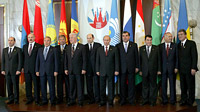The subsequent summit of the presidents of CIS countries will take place on June 9 in St. Petersburg. There is no essential change in the relations of the presidents of the CIS countries after a similar meeting a year ago. Perhaps president of Kazakhstan, Nursultan Nazarbayev, is the only one who is making passionate speeches regarding the need to maintain these relations. However, he is known not only as a partisan of the CIS, but also as the proponent for integration processes everywhere and in everything. A large part of the countries that are members of the CIS don’t hide their indifferent attitude towards this international organization, and functions merely by following Moscow. The others don’t hide their negative attitude, for example, Georgia. But it is also making demands, or setting conditions, as if it doesn’t need the CIS at all. It has already decided to stop cooperating, and will practically leave the CIS when they find it appropriate to do so.
But Tbilisi is trying to get the most out of the summit to be held. Just like last year, this year President Mikhail Sahakashvili cannot decide whether he will go or not. According to him, he will leave for St. Petersburg only if he comes face-to-face with Vladimir Putin. That was the case last year too. In the end his proposal to meet was rejected, however, he did depart to the capital of Russia and met with the Russian president. True, that meeting didn’t really help much. Russian-Georgian relations were already tense and they remained the way they were.
The president of Belarus, Alexander Lukashenko, is trying to play his own game. Energy has sufficiently destroyed ties between Moscow and Minsk, to the point that Lukashenko has even reached Venezuela in search of alternative sources of energy. He will somehow blame Moscow for the current relations with the CIS member countries without refuting the idea of constructing a United State (like the Soviet Union). But nothing will really come out of that.
Moscow is currently more interested in joint projects with Kazakhstan, Turkmenistan and quite possibly Uzbekistan in transporting the energy sources of Central Asia through its territory to the West. That is why the presidents of exactly those countries will turn into the primary figures of the summit to be held in Moscow. The other two guests of that region, whose countries lack hydrocarbon resources, will most probably be forced to participate simply as observers in the “celebration of a lifetime”, although they will somehow try to solve their own problems. For example, Tajikistan is dissatisfied with Uzbekistan, which is using its beneficial geographical position to impede the establishment of firm ties with the rich Kazakhstan. President of Moldova Vladimir Voronin will make a huge effort to “melt” the icy relations with Moscow. Recently, there were talks on the return of Moldovan produce and wines to the Russian markets. However, those products still haven’t made it to the market and the president will obviously try to speed up the process that is in delay.
Of course, the evident intrigue of the Petersburg summit will be the meeting of Armenian and Azerbaijani presidents Robert Kocharyan and Ilham Aliev. The intermediaries of the negotiations had not spread the kind of optimism in the past that they are doing now. No such concrete announcements have been made by the representatives of the Minsk Group for ages. These days they are talking about serious progress in the conflict settlement negotiations and are discussing the liberation of the seven Azerbaijani regions in a tone that makes you think that it is already a fact. They also talk interestedly about the meeting of Vladimir Putin and Victor Yushchenko. The political crisis that ended with the agreement to conduct early elections at the end of September went to show the mood of the international community. Unlike the West, Moscow sympathized with PM Victor Yanukovich. In connection with that, the possible meeting of the presidents is causing certain tension. That is, of course, if the meeting takes place.
Despite all of this, the Russian expert group predicts that nothing unusual will happen in St. Petersburg. The event is much more mundane than political. In other words, they confirm the opinion that the CIS doesn’t intend to be an effective international organization; rather it has somewhat turned into a club of the former republics of the USSR.

